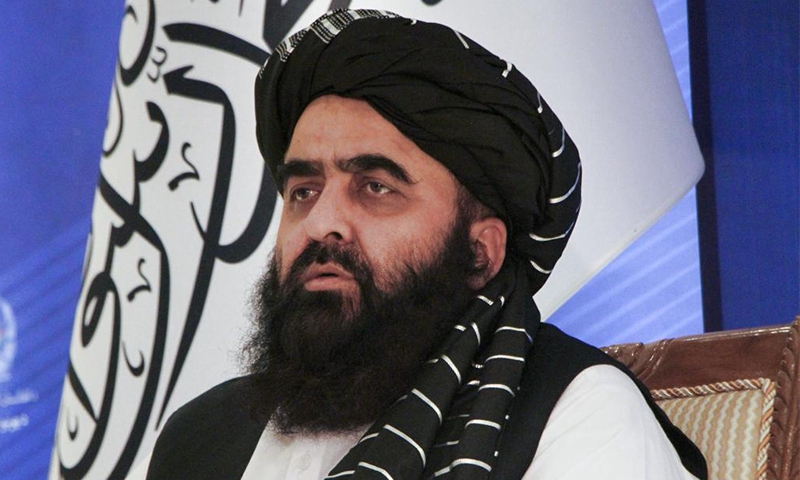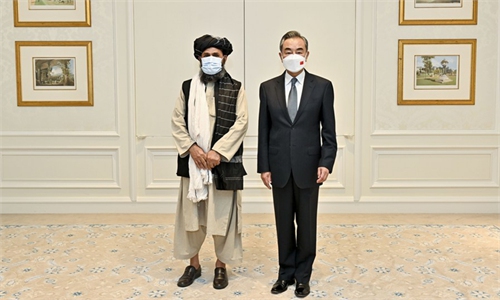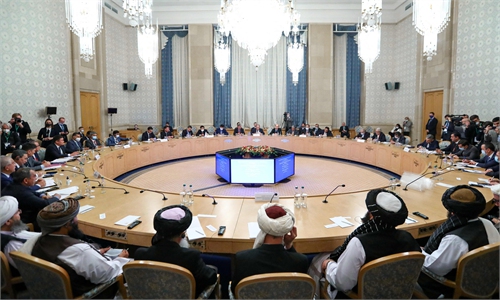Taliban acting FM reportedly to visit Pakistan, 'a step toward recognition of legitimacy'

Acting Foreign Minister Amir Khan Muttaqi speaks during a press conference in Kabul, Afghanistan, Sept. 14, 2021.Photo: Xinhua
The acting Foreign Minister of the Taliban government in Afghanistan is expected to visit Pakistan in the coming days as part of efforts by both sides to reset their ties in the wake of the Taliban's takeover of Kabul, according to media reports.
Experts on Afghan affairs told the Global Times on Monday that if Amir Khan Muttaqi goes ahead, it will be another step toward the regional recognition of the Taliban government.
The Interim Deputy Prime Minister and Foreign Minister of the Taliban government arrived in Moscow on October 20 to attend the Moscow International Conference on Afghanistan hosted by Russia. It was the first time the Taliban had visited the Russian capital and met senior Kremlin officials since taking control of Kabul in August.
Zhu Yongbiao, Director of the Center for Afghanistan Studies in Lanzhou University, told the Global Times on Monday that Muttaqi's visit to Pakistan is likely to be transactional with discussions on practical issues of mutual concern, including Afghan Taliban's role as mediator between the Pakistani government and the Pakistani Taliban.
He said the timing and choice of country of this visit was not surprising because of the special relationship and historical entanglement between the Taliban and Pakistan, which was once considered by the international community could be the first country to recognize the Taliban regime in Afghanistan.
Recently, the Taliban government and Pakistan have made rapid progress in their relations with frequent exchanges. Pakistani officials have reached a preliminary understanding with the Pakistani Taliban to seek a broader peace deal to put an end to nearly two decades of hostilities, Pakistani media reported on Friday.
Zhu believes that this is positive news for Pakistan-Afghanistan relations and the region. However, some say that the aim of the Pakistani Taliban is to improve its political status and influence through negotiations and ultimately to establish a sharia regime.
Despite the frequent recent interaction between the Taliban government and Pakistan, there is long way to go before a country recognizes the Taliban government as legitimate. In addition to the implementation of anti-terrorism commitments ensuring inclusiveness and protecting women's rights by the Taliban, there are also specific issues ahead such as borders and trade routes.
Wang Shida, Deputy Director of the Institute of South Asian Studies of the China Institute of Contemporary International Relations, told the Global Times on Monday that one possibility is that after China, Russia, Pakistan and other regional countries establish a dialogue with relevant countries in the Middle East, they will recognize the Taliban regime collectively or independently.
Previous statements from Pakistan have sent similar signals that the country would not unilaterally recognize the Taliban regime in Afghanistan. Instead, it will make its decision after full consultation with countries in and outside the region, including China and Russia.
While Zhu believes that after the visit to Pakistan, senior Taliban officials could tour the Middle East or neighboring countries like Turkmenistan and Uzbekistan to open up the diplomatic relations and discuss practical issues.


